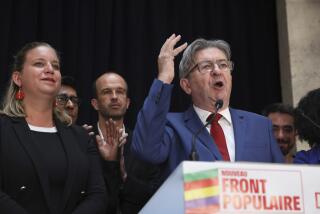Algeria Muslims’ Goal: National Control : Politics: The victorious Islamic party wants Parliament to be dissolved. ‘We have a rendezvous with history,’ the spiritual leader declares.
- Share via
ALGIERS — Islamic fundamentalists who swept to victory in Algeria’s first multi-party elections set their sights Wednesday on the national government, demanding the dissolution of Parliament and national elections within three months.
The unexpected majority won by Muslim fundamentalist candidates in preliminary municipal council returns was a stunning blow to the ruling party that has dominated Algerian politics for 27 years. It was also a source of concern for many governments throughout the region, who have watched militant Islamic groups gain increasing political power throughout North Africa.
The Algerian government probably has little choice but to accede to the fundamentalists’ demands, said one source close to the government, although neither President Chadli Bendjedid nor the ruling National Liberation Front (FLN) has responded officially.
Abbasi Madani, the spiritual leader of the victorious Islamic Salvation Front (FIS), said the dissolution of Parliament “has become a necessity” that the government cannot ignore. “We have a rendezvous with history,” he declared.
“You cannot change the base without changing the summit. . . . Once you have launched on a path, you cannot halt halfway. The train of history does not stop,” proclaimed Madani, whose party seeks to establish a conservative Islamic state in Algeria.
The fundamentalists’ victory in Algeria is expected to provide an important boost to like-minded movements in neighboring Tunisia and Morocco, where increasingly restive Muslim groups have so far been denied legal party status.
“With this kind of phenomenon, there is definitely reason for concern,” said one Western diplomat who, with other European officials, has watched the development of increasingly strong Islamic movements in a region unsettlingly close to Europe’s frontier. “You can’t ignore the fact that Islamic fundamentalists have now scored a major victory.”
With a little less than half the ballots counted from 1,514 municipal councils Wednesday afternoon, the Salvation Front had prevailed in 53.4%, trailed by the FLN with 33% and the Berber-dominated Rally for Culture and Democracy (RCD), with 8%.
RCD leader Said Sadi, whose party had sought to attract middle-class, Westernized Algerians afraid of the Salvation Front and disenchanted with the ruling party, predicted Wednesday that the government will have no choice but to open the way for new national elections and offer the fundamentalist party an even more important pass to power.
“It will be difficult to resist them now,” Sadi said. “If they (the government) resort to trickery, it will finish in the streets. . . .”
But Interior Minister Mohammed Salah Mohammedi, announcing the preliminary voting results, said he has no second thoughts about the decision to open Algeria to multi-party democracy.
“That which guided the government in its decision to opt for proportional voting was not a short-term view. It was considered an investment of value to democracy,” he said.
But nurturing alternate political parties is part of the democratic process, a way of “bringing up” a population unaccustomed to exercising political power, Mohammedi added. “It is in such a way that we prepare our students, in such a way that the minority becomes a majority and in such a way that our country ultimately gains.”
Many analysts attributed the Muslim party’s unexpected gains as a reaction against the ruling party, under whose stewardship Algeria has sunk into an economic slump that may take years to overcome. Unemployment now approaches 26%, basic goods are priced far out of reach of many consumers and housing is in woefully short supply.
Many young men and women have no hope of marrying under present economic conditions, and between the economic trauma and the flight of intellectuals alarmed at the growing power of the fundamentalists, visa applications to France now average 2,000 a day.
“My own feeling is a lot of this vote was more anti-FLN than pro-FIS. Times are very bad here, and the FIS at least offers an opposition,” said one political analyst.
Turnout in the voting, at about 60%, was surprisingly low for Algeria’s first free elections since the country gained independence from France in 1962, and many analysts attributed it to disenchantment with both major parties.
A majority showing by the fundamentalists, said one analyst, will almost force the government to open up the National People’s Assembly, now composed entirely of ruling party deputies whose terms do not expire until 1992.
Even if Bendjedid decides to call early national elections, several analysts said it is far from certain that the fundamentalists will gain control of the national government. The municipal election victory, they said, could be enough to galvanize middle-class, French-influenced Algerians who do not want to see the introduction of strict Islamic law into the former French colony, one of the most Westernized countries of the Arab world.
However, Madani said the Salvation Front is not bent on immediately seizing the presidency or on driving other parties out of Algeria’s emerging political spectrum.
“We guarantee the freedom of all who have ideas on Algeria’s future,” he said.
More to Read
Sign up for Essential California
The most important California stories and recommendations in your inbox every morning.
You may occasionally receive promotional content from the Los Angeles Times.













